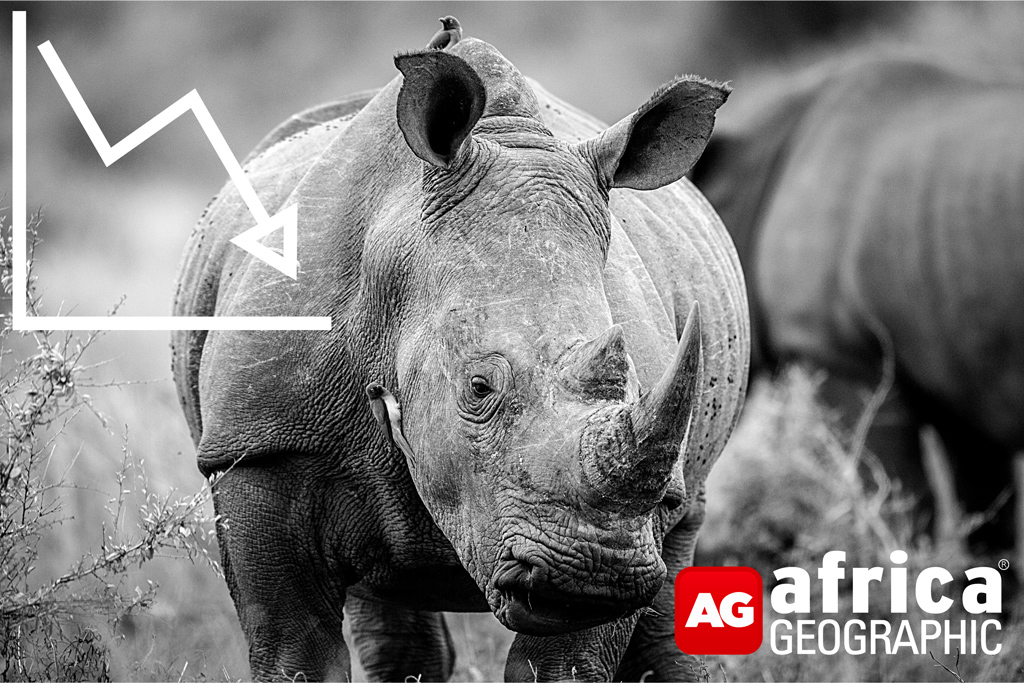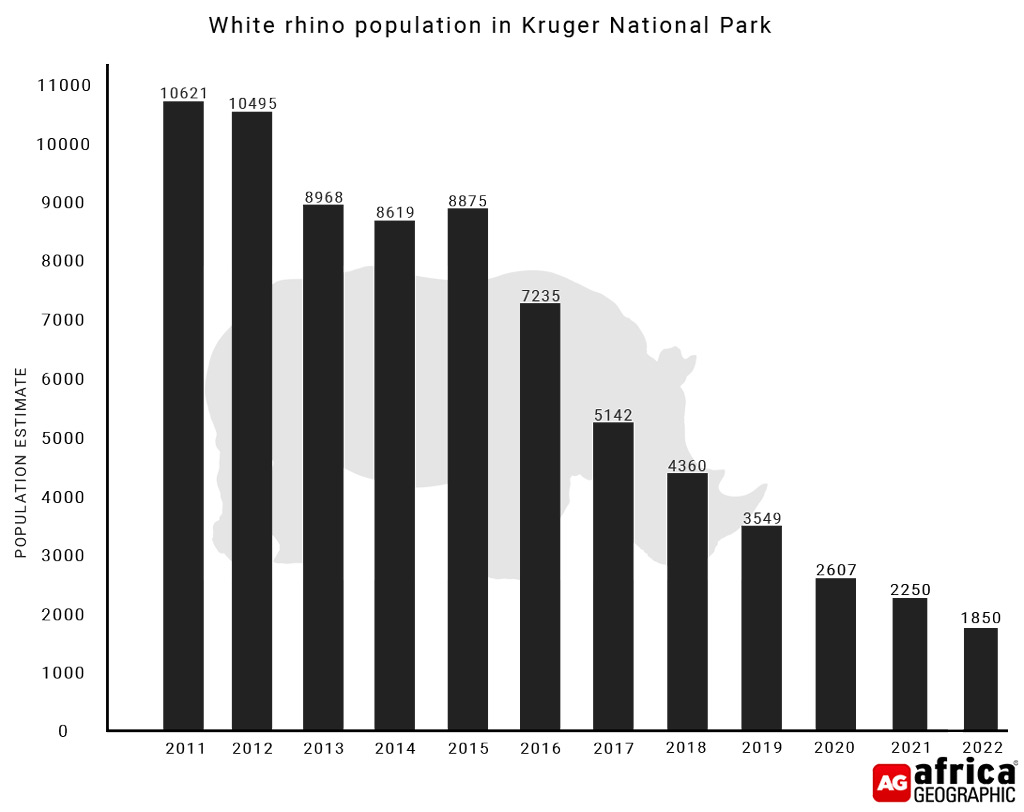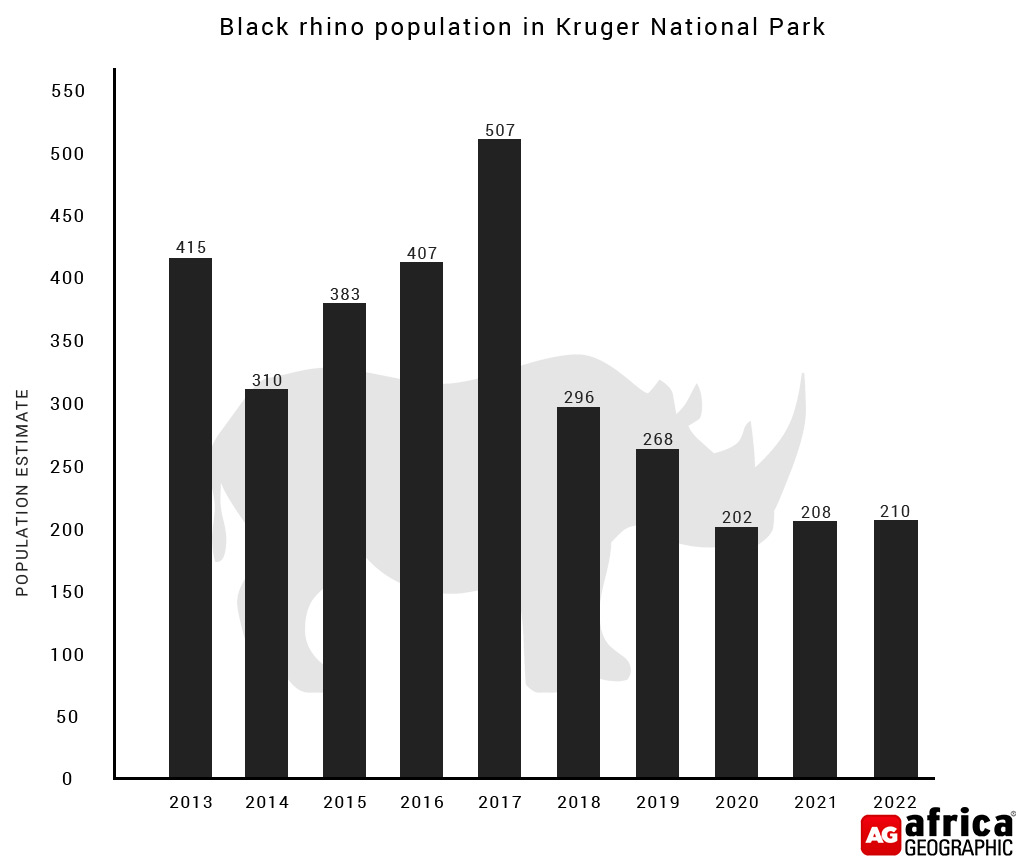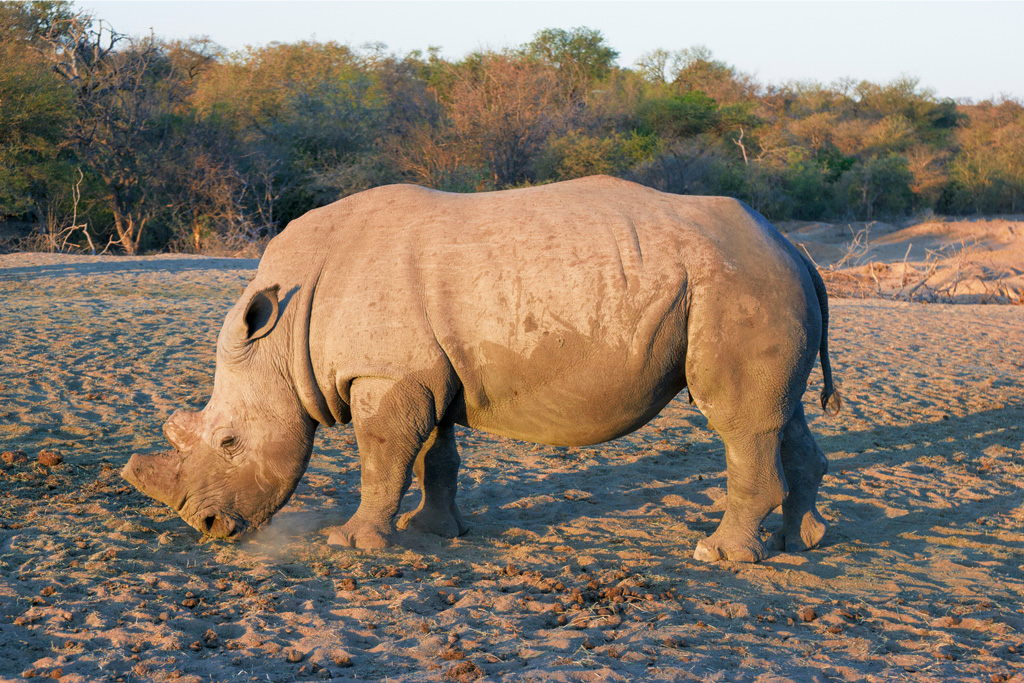The real reason state rhino cannot be saved is because officials are complicit in poaching at all levels.
Rhino Numbers and Census
- Richprins
- Committee Member
- Posts: 75997
- Joined: Sat May 19, 2012 3:52 pm
- Location: NELSPRUIT
- Contact:
Re: Rhino Numbers and Census
context-appropriate conservation programs in partnership with local people, as opposed to the blunt instrument top-down approach of an international trade ban



The real reason state rhino cannot be saved is because officials are complicit in poaching at all levels.
The real reason state rhino cannot be saved is because officials are complicit in poaching at all levels.
Please check Needs Attention pre-booking: https://africawild-forum.com/viewtopic.php?f=322&t=596
- Lisbeth
- Site Admin
- Posts: 67166
- Joined: Sat May 19, 2012 12:31 pm
- Country: Switzerland
- Location: Lugano
- Contact:
Re: Rhino Numbers and Census
Most likely considering the general ethics of SA officials 
"Education is the most powerful weapon which you can use to change the world." Nelson Mandela
The desire for equality must never exceed the demands of knowledge
The desire for equality must never exceed the demands of knowledge
- Lisbeth
- Site Admin
- Posts: 67166
- Joined: Sat May 19, 2012 12:31 pm
- Country: Switzerland
- Location: Lugano
- Contact:
Re: Rhino Numbers and Census
Kruger rhino population update – the losses continue
Posted on October 24, 2023 by teamAG in the DECODING SCIENCE post series.

Rhino populations in Kruger National Park continue to decline despite innovative strategies implemented to prevent rhino poaching. The latest population count, reported in the SANParks Annual Report 2022/2023, reveals that the total rhino population has declined by 16.2%, from an estimated 2,458 rhinos in 2021 to 2,060 in 2022.
_______________________________________________________________________________________________________________________
Despite investing in access control, air support, security staff, specialised detection technology, K9 Units, dehorning and ranger training, 98 rhinos were lost to poaching in Kruger National Park in 2022. This is a decrease of 49.7% in poaching compared to the 195 rhinos lost in 2021.
“Innovative strategies implemented in Kruger National Park, which has historically borne the brunt of this scourge, led to a decline in poaching numbers by 49,74% compared to the previous year,” says Pam Yako, Chairperson of the Board for SANParks.
7.1% of the white rhino population was lost to poaching and 3.4% of the black rhino population.
There were an estimated 1,850 (between 1,711 and 1,988*) white rhinos in Kruger by the end of 2022, compared to the 2,250 (between 1,986 and 2,513*) counted in 2021. For black rhinos, the 2022 survey estimated 210 black rhinos present in Kruger, compared to 208 for the 2021 reporting period*.
(*Editorial note: All population estimates are given a margin of error, as population counts over large areas carry uncertainty. When calculating the percentage decline/increase, these margins of error are included in the statistical analysis. Although the 2022/2023 annual report states that for “the past three years, black rhinos remained at an estimated 210 individuals,” actual estimates from these reporting periods were 208 for 2021 and 202 for 2020.)


SANParks also reported that the lagging effects of drought contributed to the continuing decline in white rhino numbers. In contrast, black rhinos did not experience the drought effect, and births were slightly higher than total losses.
The Kruger National Park Rhino Management Plan zones the park into core areas with suitable rhino habitats. In these core conservation zones, there was an overall decline of 19.58% in the rhino population, “primarily due to white rhinos leaving these areas in response to poaching and moving to known localities of suitable habitat,” according to the report. On a positive note, the black rhino population in these core conservation zones increased by 12% since 2020, and substantial increases in black rhino populations were recorded in certain priority zones.
SANParks referenced an initiative to establish rhino strongholds outside Kruger to encourage range expansion. Furthermore, 702 rhinos were dehorned in Kruger, and by the end of 2022, approximately 70% of the park’s rhinos had no horns. (Dehorning has been highlighted as an effective strategy in reducing poaching).

702 rhinos were dehorned in Kruger in 2022
Despite the decrease in poaching incidents in Kruger, reports have shown a shift in poaching away from the Kruger National Park to private reserves in KwaZulu-Natal. However, no rhinos were lost to poaching in the six other SANPArks-operated parks hosting rhinos (Addo Elephant, Karoo, Mapungubwe, Marakele, Mokala and Mountain Zebra National Parks). The rhino populations in these parks increased by 7%.
The annual report also highlights cause for concern regarding snaring for bushmeat in and around parks. SANParks removed one snare from a black rhino, treated 17 injured white and two black rhinos and recovered five white rhino orphans in Kruger, stating that many of these cases were linked to snaring targeting other species.
SANParks also reported that it has started removing disease-free rhinos from Kruger (cleared of bovine tuberculosis), but “this has limited options and can affect the dynamics between the remaining rhinos.”
While poaching rates have shown a significant decline, an analysis of Kruger National Park’s overall population estimates over the past ten years indicates a continued downward trend in rhino numbers despite an increase in anti-poaching initiatives. In the past ten years, Kruger’s total rhino population has decreased by 78%, from 9,383 in 2013 to 2,060 by the end of 2022.
“It has become evident that South Africa needs a species recovery plan for white rhino that considers the support required for conserving rhino across extensive wildlife systems,” says Minister of the Department of Forestry, Fisheries and the Environment Barbara Creecy. “Partnerships with private rhino owners will be important to the plan. SANParks has been requested to lead the development of such a recovery plan as a key element of its work in this coming financial year.”
Posted on October 24, 2023 by teamAG in the DECODING SCIENCE post series.

Rhino populations in Kruger National Park continue to decline despite innovative strategies implemented to prevent rhino poaching. The latest population count, reported in the SANParks Annual Report 2022/2023, reveals that the total rhino population has declined by 16.2%, from an estimated 2,458 rhinos in 2021 to 2,060 in 2022.
_______________________________________________________________________________________________________________________
Despite investing in access control, air support, security staff, specialised detection technology, K9 Units, dehorning and ranger training, 98 rhinos were lost to poaching in Kruger National Park in 2022. This is a decrease of 49.7% in poaching compared to the 195 rhinos lost in 2021.
“Innovative strategies implemented in Kruger National Park, which has historically borne the brunt of this scourge, led to a decline in poaching numbers by 49,74% compared to the previous year,” says Pam Yako, Chairperson of the Board for SANParks.
7.1% of the white rhino population was lost to poaching and 3.4% of the black rhino population.
There were an estimated 1,850 (between 1,711 and 1,988*) white rhinos in Kruger by the end of 2022, compared to the 2,250 (between 1,986 and 2,513*) counted in 2021. For black rhinos, the 2022 survey estimated 210 black rhinos present in Kruger, compared to 208 for the 2021 reporting period*.
(*Editorial note: All population estimates are given a margin of error, as population counts over large areas carry uncertainty. When calculating the percentage decline/increase, these margins of error are included in the statistical analysis. Although the 2022/2023 annual report states that for “the past three years, black rhinos remained at an estimated 210 individuals,” actual estimates from these reporting periods were 208 for 2021 and 202 for 2020.)


SANParks also reported that the lagging effects of drought contributed to the continuing decline in white rhino numbers. In contrast, black rhinos did not experience the drought effect, and births were slightly higher than total losses.
The Kruger National Park Rhino Management Plan zones the park into core areas with suitable rhino habitats. In these core conservation zones, there was an overall decline of 19.58% in the rhino population, “primarily due to white rhinos leaving these areas in response to poaching and moving to known localities of suitable habitat,” according to the report. On a positive note, the black rhino population in these core conservation zones increased by 12% since 2020, and substantial increases in black rhino populations were recorded in certain priority zones.
SANParks referenced an initiative to establish rhino strongholds outside Kruger to encourage range expansion. Furthermore, 702 rhinos were dehorned in Kruger, and by the end of 2022, approximately 70% of the park’s rhinos had no horns. (Dehorning has been highlighted as an effective strategy in reducing poaching).

702 rhinos were dehorned in Kruger in 2022
Despite the decrease in poaching incidents in Kruger, reports have shown a shift in poaching away from the Kruger National Park to private reserves in KwaZulu-Natal. However, no rhinos were lost to poaching in the six other SANPArks-operated parks hosting rhinos (Addo Elephant, Karoo, Mapungubwe, Marakele, Mokala and Mountain Zebra National Parks). The rhino populations in these parks increased by 7%.
The annual report also highlights cause for concern regarding snaring for bushmeat in and around parks. SANParks removed one snare from a black rhino, treated 17 injured white and two black rhinos and recovered five white rhino orphans in Kruger, stating that many of these cases were linked to snaring targeting other species.
SANParks also reported that it has started removing disease-free rhinos from Kruger (cleared of bovine tuberculosis), but “this has limited options and can affect the dynamics between the remaining rhinos.”
While poaching rates have shown a significant decline, an analysis of Kruger National Park’s overall population estimates over the past ten years indicates a continued downward trend in rhino numbers despite an increase in anti-poaching initiatives. In the past ten years, Kruger’s total rhino population has decreased by 78%, from 9,383 in 2013 to 2,060 by the end of 2022.
“It has become evident that South Africa needs a species recovery plan for white rhino that considers the support required for conserving rhino across extensive wildlife systems,” says Minister of the Department of Forestry, Fisheries and the Environment Barbara Creecy. “Partnerships with private rhino owners will be important to the plan. SANParks has been requested to lead the development of such a recovery plan as a key element of its work in this coming financial year.”
"Education is the most powerful weapon which you can use to change the world." Nelson Mandela
The desire for equality must never exceed the demands of knowledge
The desire for equality must never exceed the demands of knowledge
- Richprins
- Committee Member
- Posts: 75997
- Joined: Sat May 19, 2012 3:52 pm
- Location: NELSPRUIT
- Contact:
Re: Rhino Numbers and Census
These estimates are a total thumbsuck, always have been. As are the elephant estimates. 
Please check Needs Attention pre-booking: https://africawild-forum.com/viewtopic.php?f=322&t=596
- Lisbeth
- Site Admin
- Posts: 67166
- Joined: Sat May 19, 2012 12:31 pm
- Country: Switzerland
- Location: Lugano
- Contact:
Re: Rhino Numbers and Census
"Education is the most powerful weapon which you can use to change the world." Nelson Mandela
The desire for equality must never exceed the demands of knowledge
The desire for equality must never exceed the demands of knowledge
- Lisbeth
- Site Admin
- Posts: 67166
- Joined: Sat May 19, 2012 12:31 pm
- Country: Switzerland
- Location: Lugano
- Contact:
Re: Rhino Numbers and Census
SOUTH AFRICA’S RHINO HORN STOCKPILES: INTRINSIC TO ILLEGAL TRADE WHERE HAVE ALL THE RHINOS GONE? PART TWO
The EMS Foundation - 29.02.2024
Media Statement
On the 27th February 2024, Minister Barbara Creecy issued a media statement confirming that an alarming number of 397 rhino were killed in KwaZulu Natal in 2023, the highest number on record for this province. A total of 499 rhinos were killed throughout South Africa last year.
Explanations for the devastating loss of thousands of rhinos in South Africa, particularly over the past few years, were highlighted in the 2021 EMS Foundation publication of Where Have All the Rhinos Gone? We determined that the significant loss of rhinos are not only due to the illegal killing of rhinos, particularly over the past two decades but, these unacceptable numbers are also the result of: (i) poor, problematic policy and management decisions; (ii) the direct involvement of some of South Africa’s professional trophy hunters, corrupt members of the South African Police Service, some rhino breeders, crooked veterinarians, and nature conservation officials; and (iii) porous South African border control.
The second report, published today, entitled South Africa’s Rhino Horn Stockpiles: Intrinsic to Illegal Trade, provides further evidence of how South Africa’s rhino horn stockpiles are driving illegal trade in rhino horn.
The Report reminds us of the details of incidents where rhino breeders and their industry colleagues have, since the publication of the first report, been implicated in the illegal sale of hundreds of rhino horn, suspicious deaths of rhinos and in the possession of unmarked rhino horn.
We are living in the sixth extinction. It is inconceivable that the international rhino horn trade, which has been banned for 47 years, will ever be tolerated. Furthermore, we are currently witnessing the implosion of the rhino farming industry. The Report brings into sharp focus, South Africa’s pro-trade policy framework and its seemingly unwavering support for the questionable model of intensively breeding rhinos for horn production.
Apart from sending out the mixed message of the conservation of an almost extinct species versus the utilization of such, the pro-trade policy and the dehorning processes negatively affects biodiversity, including the survival of the rhino species.
Minister Creecy commended the work performed by the Directorate for Priority Crime Investigation, the HAWKS, in several regional and transnational engagements to enhance the government’s integrated approach to combat wildlife trafficking.
However, of increasing concern to us is South Africa’s pivotal role in the illegal international trade of rhino horn which is confirmed by numerous research projects and the content published in the South African Anti-Money Laundering Integrated Task Force report.
Further well-researched reports by renowned wildlife trade specialists and analysts were published and presented at CITES CoP19 in 2022 which illustrate the fact that harvested rhino horns have been diverted from rhino horn stockpiles in South Africa to become a major source for the illegal wildlife trade.
Our Report shows that official South African rhino horn stockpiles figures are conflicting, inconsistent, untrustworthy and cannot be verified.
The report highlights the fact that KwaZulu Natal is the current battlefield for the survival of rhino in South Africa. We provide updates on lengthy judicial processes involving alleged kingpins (sic), details of noteworthy convictions of wildlife criminals, arrests involving alleged perpetrators of wildlife crime, seizures of rhino horn in and from South Africa, and unresolved assassinations linked to rhino poaching investigations.
The urgent question that the South African government must answer is, why is it allowing the stockpiling of rhino horn? Particularly because, by doing so, it is de facto placing a dangerously contentious value to the horns in the vain hope that the international market will be reopened. This is in turn endangering the lives of the people who are protecting the rhinos, encouraging the black market, and bankrupting public and private reserves whilst they attempt to keep their rhinos secure.
The future of wild life, nature and our own human existence is literally under threat. What is needed is an urgent and total overhaul of policy and legislation and a totally different way of viewing wild life and restoring ecosystems and biodiversity. Given all the issues raised in our Briefing Report, the recommendations are:
1. Rather than banking on the extinction of rhinos, South Africa must embrace rhino horn stockpile destruction as an anti-poaching, anti-trafficking, and demand reduction tool to meaningfully contribute to the ethical protection of rhino populations in Africa and Asia and to mitigate their extinction. Doing so will send a strong signal that South Africa is firmly committed to preserving and protecting rhinos, and to truly ensuring their welfare and well-being.
2. By virtue of the precautionary approach, South Africa, and other CITES States Parties must act in the best interest of the conservation of the species and urgently uplist rhinos currently on Appendix II to Appendix I
To access the full report: https://emsfoundation.org.za/south-afri ... gal-trade/
The EMS Foundation - 29.02.2024
Media Statement
On the 27th February 2024, Minister Barbara Creecy issued a media statement confirming that an alarming number of 397 rhino were killed in KwaZulu Natal in 2023, the highest number on record for this province. A total of 499 rhinos were killed throughout South Africa last year.
Explanations for the devastating loss of thousands of rhinos in South Africa, particularly over the past few years, were highlighted in the 2021 EMS Foundation publication of Where Have All the Rhinos Gone? We determined that the significant loss of rhinos are not only due to the illegal killing of rhinos, particularly over the past two decades but, these unacceptable numbers are also the result of: (i) poor, problematic policy and management decisions; (ii) the direct involvement of some of South Africa’s professional trophy hunters, corrupt members of the South African Police Service, some rhino breeders, crooked veterinarians, and nature conservation officials; and (iii) porous South African border control.
The second report, published today, entitled South Africa’s Rhino Horn Stockpiles: Intrinsic to Illegal Trade, provides further evidence of how South Africa’s rhino horn stockpiles are driving illegal trade in rhino horn.
The Report reminds us of the details of incidents where rhino breeders and their industry colleagues have, since the publication of the first report, been implicated in the illegal sale of hundreds of rhino horn, suspicious deaths of rhinos and in the possession of unmarked rhino horn.
We are living in the sixth extinction. It is inconceivable that the international rhino horn trade, which has been banned for 47 years, will ever be tolerated. Furthermore, we are currently witnessing the implosion of the rhino farming industry. The Report brings into sharp focus, South Africa’s pro-trade policy framework and its seemingly unwavering support for the questionable model of intensively breeding rhinos for horn production.
Apart from sending out the mixed message of the conservation of an almost extinct species versus the utilization of such, the pro-trade policy and the dehorning processes negatively affects biodiversity, including the survival of the rhino species.
Minister Creecy commended the work performed by the Directorate for Priority Crime Investigation, the HAWKS, in several regional and transnational engagements to enhance the government’s integrated approach to combat wildlife trafficking.
However, of increasing concern to us is South Africa’s pivotal role in the illegal international trade of rhino horn which is confirmed by numerous research projects and the content published in the South African Anti-Money Laundering Integrated Task Force report.
Further well-researched reports by renowned wildlife trade specialists and analysts were published and presented at CITES CoP19 in 2022 which illustrate the fact that harvested rhino horns have been diverted from rhino horn stockpiles in South Africa to become a major source for the illegal wildlife trade.
Our Report shows that official South African rhino horn stockpiles figures are conflicting, inconsistent, untrustworthy and cannot be verified.
The report highlights the fact that KwaZulu Natal is the current battlefield for the survival of rhino in South Africa. We provide updates on lengthy judicial processes involving alleged kingpins (sic), details of noteworthy convictions of wildlife criminals, arrests involving alleged perpetrators of wildlife crime, seizures of rhino horn in and from South Africa, and unresolved assassinations linked to rhino poaching investigations.
The urgent question that the South African government must answer is, why is it allowing the stockpiling of rhino horn? Particularly because, by doing so, it is de facto placing a dangerously contentious value to the horns in the vain hope that the international market will be reopened. This is in turn endangering the lives of the people who are protecting the rhinos, encouraging the black market, and bankrupting public and private reserves whilst they attempt to keep their rhinos secure.
The future of wild life, nature and our own human existence is literally under threat. What is needed is an urgent and total overhaul of policy and legislation and a totally different way of viewing wild life and restoring ecosystems and biodiversity. Given all the issues raised in our Briefing Report, the recommendations are:
1. Rather than banking on the extinction of rhinos, South Africa must embrace rhino horn stockpile destruction as an anti-poaching, anti-trafficking, and demand reduction tool to meaningfully contribute to the ethical protection of rhino populations in Africa and Asia and to mitigate their extinction. Doing so will send a strong signal that South Africa is firmly committed to preserving and protecting rhinos, and to truly ensuring their welfare and well-being.
2. By virtue of the precautionary approach, South Africa, and other CITES States Parties must act in the best interest of the conservation of the species and urgently uplist rhinos currently on Appendix II to Appendix I
To access the full report: https://emsfoundation.org.za/south-afri ... gal-trade/
"Education is the most powerful weapon which you can use to change the world." Nelson Mandela
The desire for equality must never exceed the demands of knowledge
The desire for equality must never exceed the demands of knowledge
- Richprins
- Committee Member
- Posts: 75997
- Joined: Sat May 19, 2012 3:52 pm
- Location: NELSPRUIT
- Contact:
Re: Rhino Numbers and Census
Nah, this is a frustrated attempt to blame poaching on legal owners and traders. They talk about illegal trade in the same breath. 
Please check Needs Attention pre-booking: https://africawild-forum.com/viewtopic.php?f=322&t=596
- Lisbeth
- Site Admin
- Posts: 67166
- Joined: Sat May 19, 2012 12:31 pm
- Country: Switzerland
- Location: Lugano
- Contact:
Re: Rhino Numbers and Census
Not only and they must have proof declaring it like this officially 
"Education is the most powerful weapon which you can use to change the world." Nelson Mandela
The desire for equality must never exceed the demands of knowledge
The desire for equality must never exceed the demands of knowledge


